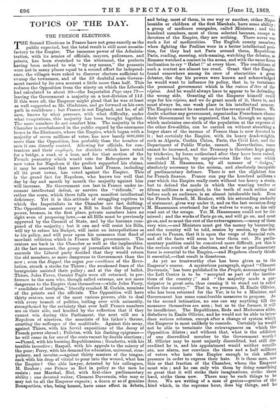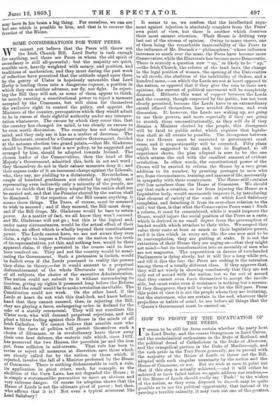TOPICS OF THE DAY.
THE FRENCH ELECTIONS. THE Second Elections in France have not gone exactly as the public expected, but the total result is still most unsatisfactory to the Empire. The immense power of the Adminis tration, with its armies of officials, mayors, policemen, and priests, has been stretched to the uttermost, the prefects having been ordered to win " by any means," the peasants were not in many places equal to a second effort for independence, the villages were raked to discover electors sufficient to swamp the townsmen, and of the 59 doubtful seats Government carried by its own account a little more than half. This reduces the Opposition from the ninety on which the Liberals had calculated to about 80—the Imperialist Pays says 79— leaving the Government a majority on a test-division of 112. If this were all, the Emperor might plead that he was at least as well supported as Mr. Gladstone, and go forward on his own path in confidence ; but France is not England, and he, of all men, knows by what pressure, with what difficulty, under what temptations, this majority has been brought together. The mere numbers do not comfort him. The majority in the Chamber is overbalanced in the public regard by the enormous losses in the Electorate, where the Empire, which began with a majority of seven millions of votes, has now barely 800,000 more than the Opposition, less probably than the number of men it can directly control. Allowing for officials, for contractors and their employes, for districts which have voted for a bridge, a road, or a loan, and for that section of the French peasantry which would vote for Robespierre as it now votes for Napoleon if the prefect supported his claims, it may be asserted that more than half France, including all its great towns, has voted against the Empire. This is the grand fact for Napoleon, who knows too well that day by day and month by month the majority against him will increase. No Government can last in France under incessant intellectual defeat, or survive the "ridicule," or rather the scorn, which there falls upon manifest intellectual deficiency. Yet it is this attitude of struggling captives to which the Imperialists in the Chamber are fast drifting. The Opposition cannot carry a Bill to limit the Emperor's power, because, in the first place, private members have no right even of proposing laws,—as all Bills must be previously approved by the Council of State, and by the bureaux composed of the majority ; but it can and will resist his Bills, will try to refuse his Budget, will insist on interpellations as to his policy, and will pour upon his measures that flood of mordant criticism which in France kills governments. The orators are back in the Chamber as well as the implacables. At the last moment, the group of journalists which in Paris controls the Liberal party decided that they would return the old members, as more dangerous to Government than the new ; even the Rappel, the organ par excellence of the Revolution, struck a stroke for Thiers ; the awakened fears of the bourgeoisie assisted their policy ; and at the day of ballot, Thiers, Jules Favre, Gamier Pages were all returned, in preference to the men who, though called extreme, are not more dangerous to the Empire than themselves—while Jules Ferry, " candidate of irreligion," literally crushed M. Cochin, nominee of the priests and the officials. The Opposition will have thirty orators, men of the most various powers, able to deal with every branch of politics, boiling over with animosity, strengthened by the certainty that over half France numbers are on their side, and kindled by the reflection that if they cannot win during this Parliament, the next will see a Napoleon of nineteen, the associate of his father's throne, courting the suffrages of the nitiltitude. Against this array, against Thiers, with his fervid expositions of the decay of French power abroad ; Pelletan, with his flashing epigrams— he will come in for one of the seats vacant by double elections ; —Picard, with his burning Republicanism ; Gambetta, with his terrible invective ; Raspail, with his appeals to the misery of the poor; Ferry, with his demand for education, universal, compulsory, and secular,—against thirty masters of the tongue, each with his drop of vitriol to pour into the wound, what has the Empire ? One able lawyer, detested by his colleagues, M. Roulier ; one Prince as Red in policy as the men he resists ; one Marshal, Niel, with first-class parliamentary ability ; one devoted writer, Clement Duvernois, who may or may not be all the Emperor expects ; a dozen or so of genuine Bonapartists, who, being honest, have some effect in debate, and being, most of them, in one way or another, either Napaleonida3 or children of the first Marshals, have some ability ; a group of mediocre renegades, called Ministers ; and two hundred members, most of them selected because, except as devotees of the Empire, they are nothing. There never was such a list of mediocrities. The English county members when fighting the Peelites were in a better intellectual position, for they had not Paris around them, Republican Paris, reading, sneering, nick-naming, watching the debates, as Romans watched a contest in the arena, and with the same fierce inclination to cry " Habet I" at every blow. The conditions of such a contest are almost too cruel. Grant that the Empire found somewhere among its crew of obscurities a great debater, the day his powers were known and acknowledged he would want to influence its policy, that is, to terminate the personal government which is the raison d'être of the regime. And he would always have to appear to be defending the wrong side. Granting all the Emperor himself could urge for his regime, and we do grant much of it, there is, and must always be, one weak place in his intellectual armour. The Empire cannot be carried on for the revenue of France. We doubt whether any government, organizedas Frenchmen choose their Government to be organized, that is, through an agency which maintains one-sixth of the population at the expense of the other five-siiths, can be carried on without absorbing a larger share of the income of France than is now devoted to it ; but certainly the Empire, with its heavy dead-weights, such as Algeria, Cochin China, Paris, the Civil List, and the Department of Public Works, cannot. Nevertheless, taxes cannot be increased, and the Treasury is therefore kept going by trickeries, by loans authorized after they have been raised, by cooked budgets, by surprise-votes like the one which assoilzied M. Haussmann, by all manner of " dodges," absolutely necessary to the system, and absolutely incapable of parliamentary defence. There is not the slightest fear for French finance. France can pay the hundred millions a year which the Empire really costs without too heavy a strain, but to defend the mode in which the wanting twelve or fifteen millions is acquired, in the teeth of such critics and before such an audience, is an almost intolerable task. Even the French Disraeli, M. Ronher, with his astounding audacity of statement, gives way under it, and on the last occasion flung M. Haussmann overboard for the wolves to worry, as his only road out of the scrape. Yet M. Haussmann could not be dismissed ; and the works of Paris go on, and will go on, and must go on, and so must the rest of the extravagances,—many of them very wise,—and. Ministers must get the money by borrowing, and the country will be told, session by session, by the first orators in France, that it is upon the verge of financial ruin, and all the facts will seem to bear them out. No parliamentary position could be conceived more difficult, yet this is the certain result of the elections, and so far as parliamentary force is essential to the Empire,—and Napoleon clearly thinks it essential,—that result is disastrous.
As yet no trustworthy clue has been given as to the Emperor's course. A mysterious paragraph, signed " Clement Duvernois," has been published in the Peuple, announcing that the Left Centre is to be "accepted as part of the institutions of the country ;" and " the majority made a participator in great acts, thus causing it to stand out in relief before the country." That is, we presume, M. Emile 011ivier, who has been returned for the Var, is to be a Minister, and Government has some considerable measures to propose. As to the second intimation, no one can say anything till the measures themselves are seen ; but as to the former, it will be insufficient. The Republicans, Reds and Moderates alike, disbelieve in Emile 011ivier, and he would not be able to introduce serious reforms, except after a change of system which the Emperor is most unlikely to concede. Certainly he would not be able to terminate the extravagances on which the Opposition dilates ; and without that, what is the addition of one discredited member to the Government worth ? M. 011ivier may be most unjustly discredited, but still discredited he is, and his appointment would neither conciliate, nor alarm, nor convince the three and a half millions of voters who hate the Empire enough to risk official pressure in order to express their hate. It is these men, not this or that fraction of the Chamber, whom the Emperor must win ; and he can only win them by doing something so great that it will strike their imaginations, strike them hard, strike them now. There may be such things to be done. We are writing of a man of genius—genius of the kind which, in the supreme hour, does big things, and he may have in his brain a big thing. For ourselves, we can see but one which is possible to him, and that is to recover the frontier of the Rhine.































 Previous page
Previous page